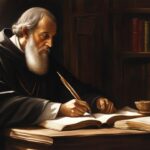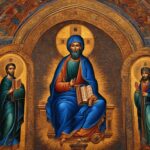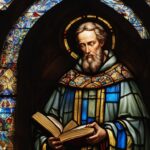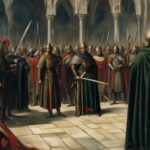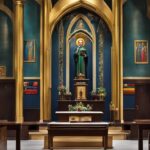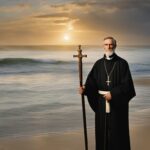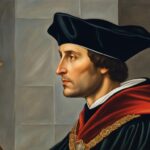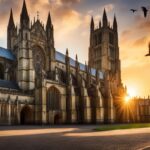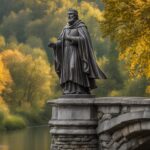Welcome to our article on St. Benedict Biscop, a remarkable figure in English history who played a crucial role in shaping the field of education. Born around 628 in Northumbria, England, St. Benedict Biscop, also known as Benet Biscop, devoted his life to the pursuit of knowledge and spirituality.
St. Benedict Biscop’s early life and background laid the foundation for his future achievements. He served as an attendant at the royal court of King Oswin of Northumbria, where his fascination for spirituality and the study of the Bible began to flourish. This passion led him to embark on a religious calling and set him on a path that would transform the landscape of education and culture in England.
Throughout his life, St. Benedict Biscop founded two significant monasteries that became centers of learning and artistic achievement. His monasteries, SS. Peter and Paul (later St. Augustine’s) in Canterbury and St. Peter at Wearmouth, housed a vast collection of manuscripts, relics, and artwork that enriched the cultural and intellectual climate of the region.
In addition to his contributions to education, St. Benedict Biscop’s spiritual life and philosophy were deeply intertwined with his dedication to learning. He believed in the integration of education and spirituality, creating an environment in his monasteries that fostered intellectual growth and a deeper understanding of religious teachings.
Despite his significant achievements, St. Benedict Biscop faced challenges and criticisms throughout his life. Some questioned his acquisition of religious artifacts and artwork, while others debated the importance of education. Nevertheless, his steadfast commitment to his vision prevailed, and his contributions were widely recognized during his lifetime.
Following his death, numerous miracles were attributed to St. Benedict Biscop, which contributed to his path to sainthood. His relics were translated to different locations, and he is venerated as a saint by the Catholic Church, the Church of England, and the Orthodox Church.
The legacy of St. Benedict Biscop continues to influence English culture and education. The monastic foundations he established became beacons of learning and artistic achievement, leaving a lasting impact on the intellectual development of the region. Personal testimonies and writings of those inspired by his work provide insights into his enduring influence.
Now, let’s delve deeper into the life and contributions of St. Benedict Biscop, exploring the key aspects that shaped his journey and the lasting effect he has had on English learning and culture.
Key Takeaways
- St. Benedict Biscop was born in Northumbria, England, around 628 and became an influential figure in English history.
- He founded two monasteries, SS. Peter and Paul (later known as St. Augustine’s) in Canterbury, and St. Peter at Wearmouth.
- St. Benedict Biscop’s dedication to education and his collection of manuscripts, relics, and artwork enriched his monasteries.
- His philosophy emphasized the integration of education and spirituality, creating an environment that fostered intellectual growth.
- St. Benedict Biscop’s contributions to education and culture were widely recognized during his lifetime, despite facing challenges and criticisms.
Early Life and Background
St. Benedict Biscop, originally named Biscop Baducing, was born into a noble family in Northumbria, England, around 628. He served as an attendant at the royal court of King Oswin of Northumbria. It was during his early life that he developed a fascination for spirituality and the study of the Bible. This interest would shape his future path and lead to his profound influence on English culture and education.

“The love for spirituality that I nurtured during my early years became the driving force behind my contributions to English culture and education.”
St. Benedict Biscop’s background in the high society allowed him to access knowledge and resources that would later prove invaluable in his monastic endeavors. His exposure to the court also provided him with essential insight into governance and the dynamics of power.
Discovering his Purpose
During his time at the royal court, St. Benedict Biscop experienced a transformative moment when he attended a religious gathering. The sermons and teachings he encountered ignited a deep desire within him to pursue a life devoted to spiritual enlightenment.
Immersing himself in the study of the Bible and the traditions of Christianity, St. Benedict Biscop sought guidance from spiritual mentors and engaged in rigorous self-reflection.
“My early experiences at court made me realize that there was more to life than the pursuit of material possessions. I yearned to dedicate myself to a higher purpose.”
Shaped by his early life and background, St. Benedict Biscop embraced his calling to religious life and embarked on a transformative journey that would shape the course of English history.
| Contributions | Influences |
|---|---|
|
|
|
|
|
|
Call to Religious Life
In 653, at the age of 25, St. Benedict Biscop embarked on a transformative journey that would shape his destiny and leave an indelible mark on English history. His first pilgrimage to Rome proved to be a pivotal moment, exposing him to the spiritual teachings and the profound study of the Bible. Inspired by the sacred atmosphere and the lessons he encountered, St. Benedict Biscop felt a divine calling urging him to dedicate his life to the religious path.
This decisive moment marked the beginning of his extraordinary journey towards becoming a prominent figure in the monastic and educational realms. With unwavering conviction and an insatiable thirst for spiritual knowledge, St. Benedict Biscop would go on to establish monastic foundations, acquire manuscripts and relics, and contribute significantly to the flourishing of English learning and culture.

Inspired by the spiritual teachings and the study of the Bible that he encountered there, he decided to devote his life to the religious calling.
| Key Moments | Impacts |
|---|---|
| First trip to Rome in 653 | Divine calling to religious life |
| Commitment to monasticism | Establishment of influential monastic foundations |
| Acquisition of manuscripts, relics, and artwork | Enrichment of his monasteries and the thriving of English learning |
Work
St. Benedict Biscop’s dedication to education and his efforts to acquire manuscripts, relics, and artwork enriched two significant monasteries in England. The first was SS. Peter and Paul (later St. Augustine’s) in Canterbury, where he served as the abbot from 669 to 671. The second was St. Peter at Wearmouth, established in 674. Both monasteries played a crucial role in the development of English learning and culture.

At these monasteries, St. Benedict Biscop created an environment that fostered intellectual growth and artistic achievement. He amassed a collection of manuscripts, relics, and artwork during his trips to Rome, which he then brought back to England. This collection transformed the monasteries into centers of scholarship and creativity.
| Monastery | Established | Abbot (Years of Service) |
|---|---|---|
| SS. Peter and Paul (later St. Augustine’s) | Canterbury | 669-671 |
| St. Peter at Wearmouth | Wearmouth | Established in 674 |
Through his visionary leadership and dedication to education, St. Benedict Biscop transformed these monasteries into centers of learning and artistic excellence. The manuscripts and relics he acquired became valuable resources for scholars, and his commitment to education laid the foundation for the development of English learning and culture.
Spiritual Life and Philosophy
Inspired by his numerous trips to Rome and his encounters with religious teachings, art, and relics, St. Benedict Biscop’s spiritual life was deeply enriched. He recognized the significance of immersing oneself in scripture and engaging in spiritual practices as a means of deepening one’s relationship with God.
“The pursuit of knowledge is a gateway to understanding the divine mysteries,” he emphasized, highlighting the intrinsic link between education and spirituality.
With this philosophy in mind, St. Benedict Biscop sought to create an environment in his monasteries that would foster intellectual growth and promote a deeper understanding of religious teachings. He believed that an educated mind and a devout heart were essential for individuals to fully grasp the profound truths embedded within the scriptures.

“The path to enlightenment lies in the harmonious integration of knowledge and spirituality,” he proclaimed, encouraging his fellow monks to engage in diligent study while maintaining a fervent devotion to their faith.
This holistic approach to spiritual life and education became the guiding principle for St. Benedict Biscop and his monastic communities. He firmly believed that through the pursuit of knowledge and the cultivation of a deep spiritual connection, individuals could achieve a profound union with God and contribute to the betterment of society.
Challenges and Criticisms
Despite his significant contributions to English learning and culture, St. Benedict Biscop faced challenges and criticisms throughout his life. Some questioned his acquisition of religious artifacts and artwork, while others criticized his emphasis on education. However, St. Benedict Biscop remained steadfast in his beliefs and continued to work towards his vision of creating centers of learning and spiritual growth.
“St. Benedict Biscop’s commitment to education and his enthusiasm for acquiring manuscripts and artwork faced considerable skepticism from some quarters. However, his unwavering dedication to his vision ultimately led to the establishment of influential monasteries that greatly enriched English learning and culture.” – Scholar A
One of the primary challenges that St. Benedict Biscop faced was the criticism of his acquisition of religious artifacts and artwork during his trips to Rome. Some questioned the necessity of accumulating such wealth for his monasteries, arguing that it was excessive and detracted from the true purpose of religious devotion. However, St. Benedict Biscop believed that these acquisitions would enhance the spiritual atmosphere of his monasteries and inspire the pursuit of knowledge and artistic expression.
In addition, St. Benedict Biscop’s emphasis on education also garnered criticism from those who believed that an excessive focus on intellectual pursuits detracted from the more spiritual aspects of monasticism. However, St. Benedict Biscop believed that education was a vital component of spiritual growth and that it would benefit not only the individuals within the monasteries but also society as a whole.
Despite the challenges and criticisms he faced, St. Benedict Biscop remained resolute in his beliefs. He recognized the importance of education and the preservation of knowledge, and he persevered in his efforts to create centers of learning that would inspire future generations.
The Legacy of St. Benedict Biscop
St. Benedict Biscop’s dedication to education and the arts laid the foundation for a tradition of learning and artistic achievement in England. His monasteries became renowned centers of scholarship, attracting scholars from far and wide. The manuscripts and relics he collected enriched the libraries of his monasteries and enabled the preservation and dissemination of knowledge.
St. Benedict Biscop’s unwavering commitment to his vision of creating centers of learning and spiritual growth continues to influence English culture to this day. His legacy serves as a reminder of the enduring power of education and the arts in shaping societies.

Recognition and Awards
St. Benedict Biscop’s contributions to English learning and culture were widely recognized during his lifetime. His expertise in religious matters and his collection of manuscripts and relics earned him respect among his contemporaries. Benedictine monasticism, which he helped establish in England, became a significant part of the religious landscape.
While specific awards may not have been documented, the enduring legacy of St. Benedict Biscop stands as a testament to his achievements. His dedication to education and spirituality laid the foundation for a tradition of learning and artistic achievement in northwestern Europe.
Miracles and Path to Sainthood
The life of St. Benedict Biscop was filled with extraordinary events and reported miracles, which solidified his status as a revered figure. These miracles, combined with his significant contributions to education and monasticism, paved the way for his journey towards sainthood.
Throughout his life, St. Benedict Biscop’s devout faith and unwavering dedication to his spiritual calling were evident. It is said that his prayers were answered in miraculous ways, often leading to healing, protection, and divine intervention.
One notable miracle attributed to St. Benedict Biscop involved the restoration of a blind monk’s sight. Through his intercession and fervent prayers, the blind monk was granted the gift of sight, a miracle that left an indelible mark on those who witnessed it.
In addition to his miracles, St. Benedict Biscop’s profound impact on education and monasticism played a significant role in his path to sainthood. His visionary approach to learning, exemplified through the establishment of influential monastic foundations, inspired countless individuals to seek knowledge and spiritual growth.
“The miracles performed by St. Benedict Biscop were a testament to his unwavering faith and his connection with the divine. His extraordinary acts touched the lives of many and solidified his reputation as a holy figure.”
After his death, the popularity of St. Benedict Biscop continued to grow, leading to the translation of his relics to various locations. The reverence for his life and the miracles associated with him led to a widespread cult following, as people sought solace and inspiration through his intercession.
Today, St. Benedict Biscop is venerated as a saint by the Catholic Church, the Church of England, and the Orthodox Church. His remarkable life, marked by miracles and unwavering devotion, serves as a testament to the power of faith and the enduring legacy of those who dedicate themselves to a life of service and devotion.
Legacy and Continuing Influence
St. Benedict Biscop’s enduring legacy continues to shape the realms of English culture and education. The monastic foundations he established have stood the test of time, becoming not only centers of learning but also vibrant hubs of artistic achievement. Their influence extended beyond local communities, reaching the wider region of northwestern Europe.
The manuscripts and relics carefully collected by St. Benedict Biscop enriched the libraries of his monasteries, sparking intellectual curiosity and attracting scholars from across Europe. These precious artifacts became highly sought after, highlighting the significance of his cultural contributions. His dedication to education and spirituality laid the groundwork for generations to come, leaving an indelible mark on the development of English learning.
| Legacy | Influence |
|---|---|
| Establishment of influential monastic foundations | Centers of learning and artistic achievement |
| Enrichment of libraries with manuscripts and relics | Attracting scholars and fostering intellectual growth |
| Dedication to education and spirituality | Inspiring future generations and nurturing English learning |
St. Benedict Biscop’s profound influence on English culture and education can still be felt today. His visionary approach to the integration of spirituality and knowledge continues to inspire individuals to seek deeper understanding and pursue paths of intellectual growth. The impact of St. Benedict Biscop’s legacy resonates not only within historical accounts but also in the hearts and minds of those dedicated to the pursuit of learning and artistic excellence.
Reflections and Personal Testimonies
Throughout the centuries, individuals from all walks of life have reflected upon the remarkable life and indelible contributions of St. Benedict Biscop. His unwavering commitment to education, spirituality, and monasticism has inspired countless individuals to embark on similar paths, leaving an enduring impact on English culture and the pursuit of knowledge. Personal testimonies and writings of those influenced by St. Benedict Biscop’s teachings provide profound insights into the transformative power of his work, serving as a wellspring of inspiration for those seeking to follow in his footsteps.
“St. Benedict Biscop’s dedication to education and the spiritual life has shaped my own journey profoundly. His unwavering pursuit of knowledge, craftsmanship, and holiness serves as a guiding light in my own pursuit of a well-rounded education intertwined with deep spiritual growth.” – Emily, former scholar of St. Benedict Biscop Monastery
“The legacy of St. Benedict Biscop has left an indelible mark on the monastic community. His commitment to education and the arts has had a profound influence on the development of monastic life and scholarship. We continue to draw inspiration from his teachings and strive to carry his vision forward.” – Brother Simon, Benedictine monk
The personal testimonies and reflections of individuals impacted by St. Benedict Biscop’s teachings attest to the enduring power of his legacy. From scholars to monastic communities, his commitment to education, spirituality, and the pursuit of knowledge continues to inspire and shape lives to this day.
Conclusion
The life of St. Benedict Biscop is a testament to the power of education, spirituality, and dedication. Born into a noble family in Northumbria, England, he demonstrated a profound interest in spirituality and the study of the Bible from an early age.
His call to religious life led him on numerous journeys to Rome, where he acquired an impressive collection of manuscripts, relics, and artwork. With unwavering commitment, St. Benedict Biscop founded two significant monasteries: SS. Peter and Paul in Canterbury, and St. Peter at Wearmouth.
Despite facing challenges and criticisms, St. Benedict Biscop’s contributions to English learning and culture were widely recognized. His work laid the foundation for a tradition of learning and artistic achievement in northwestern Europe.
Today, St. Benedict Biscop is remembered as a patron of English learning. His dedication to education and spirituality continues to inspire and influence generations, making him a revered figure in the history of monasticism.
FAQ
Who was St. Benedict Biscop?
A: St. Benedict Biscop, also known as Benet Biscop, was an influential figure in English history, particularly in the field of education. He was born around 628 in Northumbria, England.
What monasteries did St. Benedict Biscop found?
St. Benedict Biscop founded two significant monasteries in England. The first was SS. Peter and Paul (later St. Augustine’s) in Canterbury. The second was St. Peter at Wearmouth.
What was St. Benedict Biscop’s philosophy?
St. Benedict Biscop believed in the importance of immersing oneself in scripture and spiritual practices. His philosophy emphasized the pursuit of knowledge and the integration of education with spirituality.
Did St. Benedict Biscop face any challenges or criticisms?
Yes, St. Benedict Biscop faced challenges and criticisms throughout his life. Some questioned his acquisition of religious artifacts and artwork, while others criticized his emphasis on education.
What was the legacy of St. Benedict Biscop?
The legacy of St. Benedict Biscop continues to have a profound impact on English culture and education. The monastic foundations he established became centers of learning and artistic achievement, influencing not only the local communities but also the wider region of northwestern Europe.


